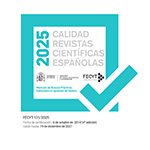External Breeding of the hospice of Madrid: paid lactation in a ville of Ávila, between social control and repression
Abstract
Since the latest days of the nineteenth and until the last third of the twentieth century, children from zero to six years old protected by the inclusa of Madrid were sent to villages in Ávila “to be raised”. More than 50 villages in Ávila took part in this «circulation of children». Based on analysing this situation, a case study is proposed, Navalmoral de la Sierra, is one of the villages that raised the most children between 1890 and 1936, however, after the Spanish Civil war no more kids were taken there. The question as to why an entire village stopped receiving children from the inclusa begged to study the context in an ethnohistorical investigation. Repression, social control, and “suitability” of women for the new state seem to be the reasons.
Downloads
Article download
License
In order to support the global exchange of knowledge, the journal Cuadernos de Historia Contemporánea is allowing unrestricted access to its content as from its publication in this electronic edition, and as such it is an open-access journal. The originals published in this journal are the property of the Complutense University of Madrid and any reproduction thereof in full or in part must cite the source. All content is distributed under a Creative Commons Attribution 4.0 use and distribution licence (CC BY 4.0). This circumstance must be expressly stated in these terms where necessary. You can view the summary and the complete legal text of the licence.











